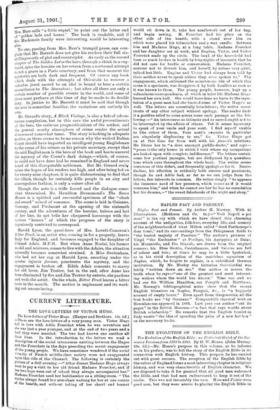C URRENT LITERAT ETRE.
THE LOVE-LETTERS OF VICTOR HUGO.
The Love.Letters of Victor Hugo. (Harper and Brothers. 10a. 6d.) —These are the love-letters of a very young man. Victor Hugo fell in love with Adele Fonrchet when be was seventeen and she was just a year younger, and at the end of two years and a half they were married. The two had known one another all their lives. In the introduction to the letters we read a description of the social intercourse existing between the Hugos and the Fourchets in the days preceding the secret engagement of the young people. We have sometimes wondered if the social vivacity of French middle-class society were not exaggerated upon this side of the Channel. The following is certainly the picture of a dull evening :—" After dinner Madame Hugo always went to pay a visit to her old friend Madame Fourchet, and if her two boys were out of school they always accompanied her." Madame Fourchet used her bedchamber as a sitting-room. " The visitor always found her arm-chair waiting for her at one corner of the hearth, and without taking off her shawl and bonnet
would sit down in it, take her needlework out of her bag, and begin sewing. M. Fourchet had his place on the other side of the hearth, with a stand near him on which were placed his tobacco-box and a wax candle. Between him and Madame Hugo, at a long table, Madame Fourchet and her daughter sat at work, and Eugene, Victor, and Victor Fonrchet made up the circle. The head of the household had been so much braken in health by long nights of insomnia that he did not care for bustle or conversation. Madame Fourchet, anxious not to disturb him, and herself, by nature very quiet, talked but little. Eugene and Victor had always been told by their mother never to speak unless they were spoken to." The engagement, which enlivened the monotonous life of which this scene is a specimen, was disapproved by both families as soon as it was known to them. The young people, however, kept up a voluminous correspondence, of which in later life Madame Hugo burned her own half. She would have done no harm to the repu- tation of a great man had she burned some of Victor Hugo's as well. The letters are essentially love-letters ; the writer never treats of any other subject without apology. The reader finds it a positive relief to come across some such passage as the fol- lowing :—" An intercourse so intimate and so sacred ought not to be interrupted by the affairs of others. Yet 'it seems necessary to speak of your uncle and your aunt. I find myself unable to like either of them. Your aunt's r *marks in particular are singularly displeasing to me," &c. Victor Hugo got on at this time far from well with his fiancée's relations. He likens her to "a dove amongst puddle-ducks," and says— "yours is the only house in which I visit where my occupations are looked upon with complete indifference." The letters contain some few poetical passages, but are disfigured by a querulous tone which runs throughout the whole book. The writer seems conscious of this defect, and frequently apologises for it. Never- theless, his affection is evidently both sincere and passionate, though he and Adele had, so far as we can judge from the letters, few interests in common. He writes simply " to appease the immense need of her presence, which seems as if it would consume him," and when he cannot see her he has no consolation bat his dreams,—" the sweet falsehoods of the night and sleep."


































 Previous page
Previous page